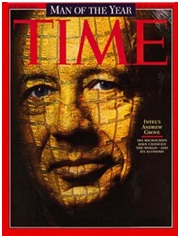|
 |
|
 |
|
|
||
Andrew Grove Leadership
Andrew (Andy) Grove (1936- )
Hungarian-born American and co-founder of the microprocessor company, Intel, and its chief executive, 1987-98 (pictured right) . Time magazine’s person of the year in 1997.
What are his tips for leadership and business success?
1. Vision and challenging objectives These must be clearly and repeatedly communicated to people specifically stating the required results and the
deadline for achieving them. He is a big supporter of Peter Drucker’s (pictured right) management by objectives i.e.
A leader must make sure that his managers get peak performance from people and constantly rising output (“high output management”). People must be challenged by setting them exceptionally high targets.
2. “Managerial leverage” This is the ability of managers to increase the output of individuals and teams and is achieved through:
3. “Only the paranoid survive” This title of his 1996 book describes how business success requires obsession with the possibility of failure. Success is never guaranteed, because it creates complacency and unwillingness to change “Success sows the seeds of its own destruction”, he says. Leaders must:
This happened in 1994 when Grove failed to immediately correct a fault in the Pentium processor, discovered by a mathematics professor. Grove is pictured right as Time magazine's person of the year in 1997.
4. Change is constant An organization must constantly change to satisfy present and future customer needs, particularly because of the Internet and rapidly improving technology. Complacency is dangerous (see point 3). For example, in response to Japanese competition in 1985, Grove made the unpopular but brilliant decision to transfer production from memory chips to more innovative and highly priced microprocessors. A key question for Grove is: What do I have to do today to solve, or better avoid, tomorrow’s problems?
5. Speed and time management Great products must be delivered as quickly as possible to beat competitors. “In our business there are the quick and there are the dead”, he says. Effective time management is vital and stealing someone else’s time is criminal.
6. Customer satisfaction Always give the customers what they want with the highest possible quality at the lowest possible cost.
7. Order within chaos He believes in a chaotic, creative work environment in which people:
But there must be order with this chaos i.e. people’s creative work (mostly in teams) must be directed towards achieving the company’s objectives like customer satisfaction. This what he meant by his famous phrase: “Let chaos reign, then rein in chaos”. 8. “The Silver Bullet Test” This asks: If you had a gun with just one silver bullet which competitors would you shoot? This concentrates people’s minds on their main enemy.
9. Drive, passion and determination Ever since fleeing to America from the communists in his native Hungary in 1957, he has had the:
a) will to win (an intensive competitive urge to be the best)
b) determination to overcome personal setbacks (like prostate cancer and persecution as a Jew by the Nazis).
“You must continually dedicate yourself to retaining your individual competitive advantage”, he says.
10. Respect Employees admired his hard work, compassion, ability and humility. At Intel he had an office cubicle like everybody else.
Key quotes on business success and change Success breeds complacency. Complacency breeds failure. Only the paranoid survive. In our business there are the quick and the dead. The greatest danger is in standing still.
Key quote on creativity and innovation Let chaos reign, then rein in chaos.
Key quote on technology A fundamental rule in technology says that whatever can be done will be done.
Key quote on decision making You have to pretend you’re 100 percent sure. You have to take action; you can’t hesitate or hedge your bets
Key quote on careers Nobody owes you a career.
Key quote on management The output of a manager is the output of the organizational units under his or her supervision or influence. |
|
|
||
|
|
||
| Copyright © wisdomtowin.com 2025 All Rights Reserved | ||
|







